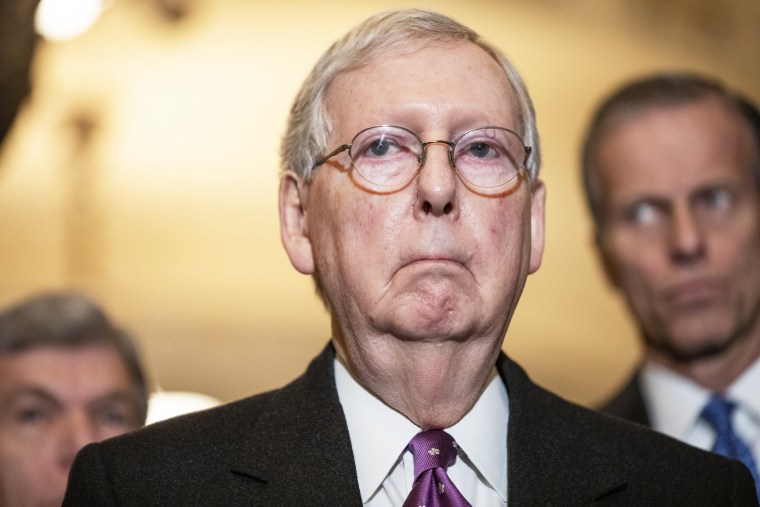Senate Minority Leader Mitch McConnell (R-Ky.) has heard the talk in Democratic circles about reforming filibuster rules and returning the Senate to a majority-rule institution. In fact, he's heard so much of this chatter that the Kentucky Republican spoke on the Senate floor yesterday to threaten his Democratic colleagues with dire consequences should they execute the so-called "nuclear option."
"Let me say this very clearly for all 99 of my colleagues: Nobody serving in this chamber can even begin — can even begin to imagine — what a completely scorched-earth Senate would look like," McConnell said in a Senate speech. McConnell said the partisan gridlock of the Trump and Obama eras would look like "child's play" compared to what's to come.
The full text of McConnell's prepared remarks was posted to his office's website, and they're worth reading in detail. The GOP leader sketched out a political nightmare of sorts in which the Senate as an institution, which relies on unanimous consent to perform even routine tasks, would move at "a snail's pace" all day, every day, on literally every measure, for the indefinite future.
In other words, the Senate minority leader has a plan: if Democrats allow the chamber to begin passing legislation with majority support, McConnell will make it nearly impossible for the Senate to function at all.
The GOP leader added that his party would proceed to take advantage of the proposed reforms, imposing "all kinds of conservative policies" on the United States "with zero input" from a future Democratic minority. McConnell's threatened agenda would include anti-union measures, defunding Planned Parenthood, expansive oil drilling, and new anti-abortion laws.
The Republican's point wasn't subtle: McConnell wants Democrats to believe it's in their interests to leave the dysfunctional Senate as is.
Broadly speaking, there are two important takeaways to keep in mind about McConnell's threat. The first problem is that the minority leader's pitch is wildly unpersuasive.
We know, for example, that in recent years, Democratic and Republican Senate majorities exercised the "nuclear option" -- to confirm cabinet nominees and judicial nominations -- and while the moves were controversial, no "nuclear winter" followed. It makes yesterday's chest-thumping appear hollow.
What's more, the Republican leader's pitch is burdened by a circular, self-defeating message: McConnell's core argument is that if Democrats try to pass legislation, he'll make it more difficult to pass legislation, so they should simply be satisfied doing nothing, or he'll take steps to make sure they do nothing.
Meanwhile, if McConnell's "scorched-earth Senate" makes it impossible for the institution to complete even the most routine of tasks, Democrats could reform those rules, too.
To be sure, McConnell's far-right policy vision likely struck Democrats as unappealing. But what the GOP leader didn't mention is that those ideas are widely unpopular -- I suspect Democratic ad-makers were glad to see yesterday's speech -- and Democrats already have reason to fear that those same regressive ideas will be imposed on the nation anyway thanks to state governments and a Trumpified federal judiciary.
He also neglected to mention that if a Republican minority were to respond to a Democratic "nuclear option" by bringing the Senate to a halt, a Democratic minority could do the same thing the next time the GOP is in charge.
For that matter, McConnell already brushed past the fact that the status quo already resembles his imagined scenario: GOP senators forced an 11-hour bill-reading before voting on the latest COVID relief package, and Republican senators spent the Trump era trying to pursue regressive priorities "with zero input" from Democrats.
But even if we put all of these relevant details aside, a larger truth came into focus yesterday: McConnell seems awfully worried. When filibuster reform was a relatively fringe idea, embraced by a handful of senators tilting at windmills, the Kentucky Republican had the luxury of ignoring the quiet conversation.
The landscape has since changed -- and it appears to have left the GOP leader rattled. McConnell said no sitting senator "can even begin to imagine what a completely scorched-earth Senate would look like." But therein lies the rub: McConnell clearly has imagined it.
The minority leader doesn't want to hear this, but it's within his power to take the wind from reformers' sails. If McConnell sincerely wants to leave the status quo in place, and quash talk of ending or altering the filibuster, he can start allowing the Senate to function like a healthy legislative body again. He and his party can start seeing the value in compromising and governing.
Reformers are gaining traction precisely because McConnell -- the man principally responsible for breaking the Senate in the first place -- has made their job easy. He wants to leave the current rules alone? Fine. Start allowing senators to govern again and reformers will have far less to say.

